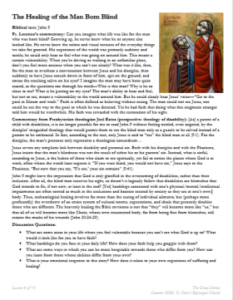![]()
Biblical text: John 9
Fr. Lorenzo’s commentary: Can you imagine what life was like for the man who was born blind? Growing up, he never knew what he or anyone else looked like. He never knew the colors and visual textures of the everyday things we take for granted. His experience of the world was primarily auditory and tactile; he could only hear or feel what was going on around him. This meant a certain vulnerability. When you’re driving or walking in an unfamiliar place, don’t you feel more anxious when you can’t see clearly? What was it like, then, for the man to overhear a conversation between Jesus and his disciples, then suddenly to have Jesus crouch down in front of him, spit on the ground, and smear the resulting saliva on his eyes? I imagine the man may have been quite scared, as the questions ran through his mind—Who is this man? Why is he so close to me? What is he putting on my eyes? The man’s ability to hear and feel, but not to see, meant a vulnerability to the world around him. But he could clearly hear Jesus’ voice—“Go to the pool in Siloam and wash.” Faith is often defined as believing without seeing. The man could not see Jesus, nor could he see the way to the pool to which he was directed. Yet he had faith that doing what this enigmatic stranger told him would be worthwhile. His faith was rewarded with the restoration of his sight.
Commentary from Presbyterian theologian Joel Estes (perspective: theology of disability): [As] a parent of a child with disabilities, it is no longer possible for me to read John 9 without feeling nettled, even angered, by the disciples’ misguided theology that would permit them to see the blind man only as a puzzle to be solved instead of a person to be embraced. In fact, according to the text, only Jesus is said to “see” the blind man at all (9:1). For the disciples, the man’s presence only represents a theological conundrum…
Jesus severs any simplistic link between disability and personal sin. Both with his disciples and with the Pharisees, Jesus insists that the man’s blindness was not the result of either his or his parents’ sin. Instead, what is sinful, according to Jesus, is the hubris of those who claim to see spiritually, yet fail to notice the places where God is at work, often where the world least expects it. “If you were blind, you would not have sin,” Jesus says to the Pharisees, “But now that you say, ‘We see,’ your sin remains” (9:41).
John 9 might leave the impression that God is only glorified in the overcoming of disabilities, rather than their inclusion. After all, the blind man receives his sight, so doesn’t it logically follow that disabilities are blemishes that God intends to fix, if not now, at least in the end? [Yet] hardships associated with one’s physical/mental/intellectual impairments are often rooted as much in the exclusions and barriers erected by society as they are in one’s own body. Thus, eschatological healing involves far more than the curing of individual ailments, but (perhaps more profoundly) the overthrow of an entire system of cultural norms, expectations, and ideals that presently disables those who are different. The heavenly healing the Bible envisions is not that “they” will become more like “us,” but that all of us will become more like Christ, whose own resurrected body, far from being free from blemishes, still retains the marks of his wounds (John 20:24-29).
Discussion Questions:
- What are some areas in your life where you feel vulnerable because you can’t see what God is up to? What would it look like for you to have faith?
- What hardships do you face in your daily life? How does your faith help you grapple with them?
- What are some ways in which you can be more hospitable towards those who differ from you? How can you learn from those whose abilities differ from your own?
- What is your emotional response to this story? How does it relate to your own experience of suffering and healing?



Comments are closed.